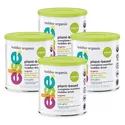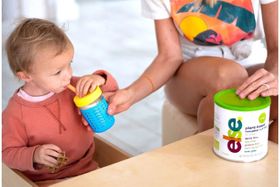Plant Based Milks vs. Toddler Formulas: What's In Your Toddler's Sippy Cup?
Updated June 11, 2024

Curious about the contents of your toddler's sippy cup? This article compares plant based milks and toddler formulas, helping you make informed choices for your little one.
As babies approach 12 months of age and are ready to transition away from breast milk or formula, it was, and still is, a common practice to transition to whole cow’s milk.
Whole milk is nutrient-dense, containing plenty of calories, protein, carbohydrates and fat. In 1 cup (8 ounces) of whole milk, there are about 150 calories, 8 grams of protein, 8 grams of fat, and 12 grams of carbohydrates. While 1-year-olds need about 900 calories, and 2-year-olds need about 1000 calories daily (according to the American Academy of Pediatrics) 2-3 cups of milk add up nicely towards that goal.
» Ensure your little one is getting enough nutrients and calories with this plant based toddler formula
Developmental Milestones in Toddlers
As a Mom of two boys, I distinctly remember feeling confident on those days of picky eating (or just busy, non-eating days) that, “At least they drank their milk,” and likely got some fruits and a couple of bites of other foods. That is because there is SO much occurring developmentally with toddlers at this age. They are beginning to walk, or at least crawl fast, and pull themselves up, and explore. They are starting to communicate, talk, and interact more with their surroundings, family, and peers.
» Struggling with your little picky eaters? Try making them some of these delicious options
They are testing parents and caregivers, for example when they throw their plate of food on the floor and await Mom’s reaction. They are transitioning from breast/bottle to cups, spoons/fork and more finger foods. Their little growing brains and bodies are VERY busy! Food may become less of a focus, as walking, talking, playing, and the wide world around them become more intriguing than their meals and snacks. In fact, both my boys had terrible food jags that started between 12-14 months of age and lasted quite a number of months. Even with all my knowledge, experience, and years as a Pediatric Dietitian, picky eating can get pretty frustrating for parents and caretakers. But as I mentioned above, I had my boys’ milk as my insurance policy.
Exploring Dairy Alternatives
What if my boys didn’t like milk? What if they had a milk allergy? What if they were vegan? What other non dairy milk alternatives were/are available when milk is not an option for you toddler? Let’s review some of the plant based milk for toddlers being used as a substitute to cow's milk formulas.
» Read everything you need to know about milk and dairy alternatives for your child here
Almond Milk
Many of the almond milks (and other plant based milks) on the shelf today contain added sugar, ranging from 5-15 grams per cup. The United States Department of Agriculture (USDA) recently published the 2020-2025 DGA (Dietary Guidelines Report for Americans) and included the 0-2 years age group in this report for the first time, due to a congressional mandate. The USDA states: “The first 1,000 days of an infant and child’s life, beginning at conception and continuing through the second year of life, are crucial for ensuring optimal physical, social, and psychomotor growth and development and lifelong health.” They recommend that parents “avoid [offering] food and beverages with added sugars during the first 2 years of life.” The purpose of this guideline is to work towards reducing the rise of childhood obesity.
Almond milks also often contain added gums, such as guar gum, locust bean gum, and gellan gum. Gums are food additives that are emulsifiers, used to bind and stabilize ingredients. Although more research needs to be done on emulsifiers, regular intake may affect the gut microbiome and digestion.
There are almond milks available that are unsweetened and free of gums. Plus, a homemade version is always an option. However, with almond milk offering only 30-90 calories, 1 gram of protein, 2 grams of carbohydrates, and only about 3 grams of fat per cup, the low nutrient density doesn’t compare to that of breast milk, infant formula or whole milk that young toddlers require. A sweetened almond milk may have up to 16 grams of carbohydrates per serving, but most of this is JUST from the added cane sugar.
» Know your ingredients! Check out the health benefits of almonds for babies and kids.
Oat Milk
“Low-fat” oat milk without added sugars and oil only has 90 calories, 3 grams of protein, 1 grams of fat per cup. Although it does have 16 grams of carbohydrates per cup, it still doesn’t match up nutrient-wise to breast milk, whole milk, or toddler formula. “Full-fat” oat milk has added rapeseed oil, which brings the calories up to 160 and the fat content up to 9 grams per cup. This is a refined and processed oil, where high temperatures, solvents, and bleach are used to create the final product used in foods. Even with this less than ideal addition, the protein content still remains too low in these oat milks, making this a poor milk substitute for toddlers.
Soy Milk
About 8-14% of children who are allergic to milk also have an adverse reaction to soymilk, so this is clearly not an option for these kids. Soymilk that is not labeled organic may be made from genetically modified (GMO) soybeans. Many soymilk brands, similar to almond milk brands, also add refined cane sugar and gums to their products. Even unsweetened soy milk still contain added gums. Yes, one cup of unsweetened soymilk does have 7 grams of protein, but it only has 80 calories, 4 grams of fat and 3 grams of carbohydrates. Again, you see that this is not a nutrient-dense substitute for milk or toddler formula.
» Find here all the reasons why you should switch to soy-free formula
Another problem with all of these plant based milk alternatives is that the “healthy” versions may be rejected by toddlers if they simply don’t taste good. Sugars are added to make the products taste good. Gums are added to create a smooth consistency and mouthfeel. Without these additions, the plain or even homemade versions may not even appeal to children, who may not even drink them (on top of the nutrition being inferior).
» Find out more reasons why you should avoid soy-based formula
Toddler Formulas
As mentioned above, toddlers with food allergies/sensitivities and/or vegan lifestyles may be fed alternative milks that do not match the nutrient density of breastmilk or whole milk. For this reason, many companies have developed products that do have sufficient calories, protein, fat, and carbohydrate content. These values match the nutrient profile of breast milk or whole milk. Some are even more nutrient-dense, having up to 300 calories and 35 grams of carbohydrates per 1 cup. Although such formulas may “do the job” of ensuring proper weight gain and growth of toddlers, they may not be the best or healthiest options for these little ones. Although toddlers may accept them and enjoy their taste, here are the issues:
- They all contain added sugars, ranging from 6 to 17 grams per cup. Note that all of these terms mean sugar: cane sugar, organic cane sugar, corn syrup, corn syrup solids, brown rice syrup, and agave. These are often the first, second, or third items in the ingredient list of the products. That means sugar makes up the majority of the formula. (Ingredients are always listed in order of predominance, with those in the greatest amount listed first, with the rest listed in descending order.)
- All have added refined, processed vegetable oils. Instead of using ingredients that are naturally high in fat, you will find sunflower oil, soybean oil, canola oil, corn oil, and canola oil in all of these products. Many of these refined and processed oils are not organic. They are also processed using bleach and chemical solvents. These oils are high in omega 6 fatty acids, which, when consumed in excess and on a regular basis in processed foods (like these formulas), can be inflammatory.
- Many contain “Artificial Flavors”, which are chemicals synthesized in a laboratory from inedible substances. “Natural Flavors” are also made in a lab with chemicals, but they are extracted from edible items. Some even contain artificial sweeteners (in addition to sugar) to make them even sweeter. Not only are artificial sweeteners harmful to the gut microbiome, they are exponentially sweeter than sugar and lead to increased sugar cravings.
- They contain gums and gels that are used to create a good mouthfeel, or smooth texture. Research has shown that these emulsifiers can be tough on digestion and may negatively affect the gut microbiome.
- Most consumers already know to look for plant based milks that DO NOT contain carrageenan, but some popular toddler formulas still contain this ingredient. It is an additive used to stabilize or thicken processed foods. Research suggests regular intake could cause inflammation in the gut, and most respected health experts suggest it be avoided in foods.
As a Mom and Registered Dietitian, I would prefer NOT to give any of these toddler formulas to my children or clients. Have they been a temporary band aid for past clients who have had particularly picky eaters, allergies, or a failure to thrive diagnosis? Sure, but I always did my best to get them off these and onto real foods. Could parents, especially with the help of a dietitian, be successful in feeding their toddlers a healthy balanced vegan diet just using clean or homemade plant based milks? Perhaps…but only if their toddler consistently eats all of the carefully planned out menu offered to him or her. If this is your toddler, you are extremely lucky! My two boys often threw their pretty meals on the floor or ran away from them to go find each other, a toy, or another inanimate object that they shouldn’t be putting in their mouth! Like I said: I had milk as my backup--that was the best and only option for ME at the time.
» Discover the key signs that formula isn't suitable for your baby
Introducing Clean, Whole Food, Plant Based Toddler Nutrition
Finding plant based milk alternatives for your baby has never been easier. NOW finally, parents, caregivers and healthcare professionals can be confident knowing that there is something ELSE clean and natural available for their vegan, allergic, sensitive and/or picky toddlers. Else Nutrition Plant based Complete Nutrition Drink for Toddlers is certified organic. It contains much less sugar than other products on the market. It tastes good and has a mild flavor. It is 100% vegan, making it a perfect addition to add to your toddler’s plant based diet. It is dairy, soy, and gluten-free. It matches the nutrient composition values of human breast milk (produced by women 12 months postpartum). Three ingredients make up 92% of the product.
» Choose the right nutrition for healthy growth
Together these make Else higher in fiber of and lower in saturated fats than other available formulas.
Plant based milk for babies shouldn’t be hard to find, which is why Else created the perfect formula made from real, clean ingredients, with no fillers, preservatives, or additives. Else Plant Based Complete Nutrition drink was designed to provide complete nutrition for toddlers aged 12 months and up. It can be used daily or occasionally. It can be part of a nutrition plan that also includes any combination of breast milk, cow's milk or solid foods. Since we know variety is best, why not offer it in exchange for milk even if your child is not allergic, doesn’t have a lactose intolerance or isn’t vegan?! It can be used alone as a beverage or added to yogurts, soups, smoothies, popsicles and other dishes.
The content and advice provided in this article is for informational purposes only and is not a substitute for medical diagnosis, treatment, advice for specific medical conditions. Always consult a pediatrician to understand the individual needs of your child.










